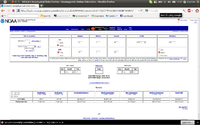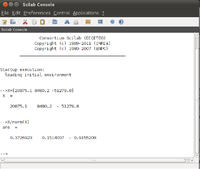Difference between revisions of "Subsystem/ahrs"
(Added basic info at the end of each AHRS section for users ... if info is incorrect please correct it) |
m |
||
| Line 62: | Line 62: | ||
Suitable for fixedwings. Needs GPS! | Suitable for fixedwings. Needs GPS! | ||
<br/> | <br/> | ||
Suitable for rotorcraft if the magnetometer is calibrated. | |||
<br/> | <br/> | ||
The arithmetic is [http://en.wikipedia.org/wiki/Fixed-point_arithmetic fixed point] and is thus suitable if the processor (on your board) has no [http://en.wikipedia.org/wiki/Floating_point_unit FPU]. | The arithmetic is [http://en.wikipedia.org/wiki/Fixed-point_arithmetic fixed point] and is thus suitable if the processor (on your board) has no [http://en.wikipedia.org/wiki/Floating_point_unit FPU]. | ||
| Line 104: | Line 104: | ||
Suitable for fixedwings. Needs GPS! | Suitable for fixedwings. Needs GPS! | ||
<br/> | <br/> | ||
Suitable for rotorcraft if the magnetometer is calibrated. | |||
<br/> | <br/> | ||
The arithmetic is [http://en.wikipedia.org/wiki/Floating_point floating point] and is thus '''not''' suitable if the processor (on your board) has '''no''' [http://en.wikipedia.org/wiki/Floating_point_unit FPU]. | The arithmetic is [http://en.wikipedia.org/wiki/Floating_point floating point] and is thus '''not''' suitable if the processor (on your board) has '''no''' [http://en.wikipedia.org/wiki/Floating_point_unit FPU]. | ||
| Line 136: | Line 136: | ||
Suitable for fixedwings with GPS. | Suitable for fixedwings with GPS. | ||
<br/> | <br/> | ||
Possibly suitable for rotorcraft if the magnetometer is used to | Possibly suitable for rotorcraft if the magnetometer is used to determine the yaw and well calibrated, which seems to be questionable at the moment. | ||
<= This information needs an update (see info above)! | <= This information needs an update (see info above)! | ||
<br/> | <br/> | ||
| Line 173: | Line 173: | ||
Repeat from above: '''Not''' suitable for fixedwings. | Repeat from above: '''Not''' suitable for fixedwings. | ||
<br/> | <br/> | ||
Suitable for rotorcraft. The magnetometer is used to | Suitable for rotorcraft. The magnetometer is used to determine the yaw and needs to be calibrated. | ||
Recommended replacement: [[Subsystem/ahrs#Complementary_Quaternion_.28fixed_point.29|int_cmpl_quat]] | Recommended replacement: [[Subsystem/ahrs#Complementary_Quaternion_.28fixed_point.29|int_cmpl_quat]] | ||
<br/> | <br/> | ||
Revision as of 12:27, 17 October 2013
AHRS subsystem
The Attitude and Heading Reference System subsystem specifies which attitude estimation filter you are using.
Currently possible AHRS subsystem types are
e.g. for the latest complementary filter:
| File: conf/airframes/myplane.xml |
<firmware name="fixedwing or rotorcraft">
...
<subsystem name="ahrs" type="int_cmpl_quat"/>
</firmware>
|
Implementations
There is a test program ( sw/airborne/test/ahrs/compare_ahrs.py ) to compare different AHRS implementations on simple test cases.
Caution! Please also see issue 93 about proper handling of BODY_TO_IMU in all AHRS algorithms.
Complementary Quaternion (fixed point)
- Estimates the gyro bias.
- By default uses magnetometer for heading.
- In v3.9 and later:
- Compensation of centrifugal force via GPS speed (to fly in circles with a fixedwing).
Enabled with AHRS_GRAVITY_UPDATE_COORDINATED_TURN which is set by default for a fixedwing firmware. - GPS based heading estimation: https://github.com/paparazzi/paparazzi/issues/130
- Compensation of centrifugal force via GPS speed (to fly in circles with a fixedwing).
Other flags of interest are:
- AHRS_PROPAGATE_LOW_PASS_RATES : apply a low pass filter on rotational velocity
- AHRS_MAG_UPDATE_ALL_AXES : available since v3.9 use mag to also update roll/pitch and not only yaw (not recommended in most cases)
- AHRS_MAG_UPDATE_YAW_ONLY : removed in v3.9, default behaviour since only update the yaw instead of all axes
| File: conf/airframes/myplane.xml |
<firmware name="fixedwing or rotorcraft">
...
<subsystem name="ahrs" type="int_cmpl_quat"/>
</firmware>
<section name="AHRS" prefix="AHRS_">
<define name="H_X" value=" 0.51562740288882"/>
<define name="H_Y" value="-0.05707735220832"/>
<define name="H_Z" value=" 0.85490967783446"/>
</section>
|
Also see the Local Magnetic Field section.
No danger of gimbal lock, since quaternions are used.
Suitable for fixedwings. Needs GPS!
Suitable for rotorcraft if the magnetometer is calibrated.
The arithmetic is fixed point and is thus suitable if the processor (on your board) has no FPU.
Complementary Quaternion/Rotation Matrix (floating point)
- Estimates the gyro bias.
- By default uses magnetometer for heading.
- You need to define either AHRS_PROPAGATE_RMAT or AHRS_PROPAGATE_QUAT (select if the propagation is done in rotation matrix or quaternion representation).
- In v3.9 and later:
- Compensation of centrifugal force via GPS speed (to fly in circles with a fixedwing).
Enabled with AHRS_GRAVITY_UPDATE_COORDINATED_TURN which is set by default for a fixedwing firmware. - GPS based heading estimation: https://github.com/paparazzi/paparazzi/issues/130
- Compensation of centrifugal force via GPS speed (to fly in circles with a fixedwing).
Other flags of interest are:
- AHRS_PROPAGATE_LOW_PASS_RATES : apply a low pass filter on rotational velocity
- AHRS_MAG_UPDATE_ALL_AXES : use mag to also update roll/pitch and not only yaw (not recommended in most cases)
- AHRS_GRAVITY_UPDATE_NORM_HEURISTIC: lower the gain of the gravity update based on a acceleration norm heuristic (e.g. good for bungee takeoff)
| File: conf/airframes/myplane.xml |
<firmware name="rotorcraft or fixedwing">
...
<subsystem name="ahrs" type="float_cmpl_rmat">
<define name="AHRS_PROPAGATE_QUAT"/>
</subsystem>
</firmware>
<section name="AHRS" prefix="AHRS_">
<define name="H_X" value=" 0.51562740288882"/>
<define name="H_Y" value="-0.05707735220832"/>
<define name="H_Z" value=" 0.85490967783446"/>
</section>
|
Also see the Local Magnetic Field section.
No danger of gimbal lock, since quaternions are used.
Suitable for fixedwings. Needs GPS!
Suitable for rotorcraft if the magnetometer is calibrated.
The arithmetic is floating point and is thus not suitable if the processor (on your board) has no FPU.
DCM (floating point)
- No direct gyro bias estimation, but also compensates for attitude drift.
- Uses GPS speed for heading.
- Compensation of centrifugal force via GPS speed (to fly in circles with a fixedwing).
- Careful, it doesn't handle all BODY_TO_IMU rotations (mounting positions) correctly!
The algorithm was developed by William Premerlani and Paul Bizard. The theory can be found here: DCMDraft2.pdf The algorithm is also used in the AHRS systems of the AdruIMU. The name DCM for the algorithm is really a misnomer, as that just means that the orientation is represented as a DirectionCosineMatrix (rotation matrix). But since people already know it under that name, we kept it.
Other flags of interest are:
- USE_MAGNETOMETER : use magnetometer to update yaw (untested ? The magnetometer code has to be improved, since ferromagnetic materials affect the magnetic field. This is currently not implemented.)
| File: conf/airframes/myplane.xml |
<firmware name="rotorcraft or fixedwing">
...
<subsystem name="ahrs" type="float_dcm"/>
</firmware>
|
Possible danger of gimbal lock, since quaternions are not used.
Suitable for fixedwings with GPS.
Possibly suitable for rotorcraft if the magnetometer is used to determine the yaw and well calibrated, which seems to be questionable at the moment.
<= This information needs an update (see info above)!
The arithmetic is floating point and is thus not suitable if the processor (on your board) has no FPU.
Complementary Euler (fixed point)
- Not recommended for fixedwings, as this filter doesn't compensate for centrifugal force when flying turns.
- Magnetometer is always only used for heading (yaw).
- Does not handle the accel and mag updates correctly if BODY_TO_IMU is used for more than just adjustment by a few degrees.
- In general, rather use int_cmpl_quat
Optional flags/defines are:
- FACE_REINJ_1 : defaults to 1024
- IMU_MAG_OFFSET : offset to subtract from the heading calculated by the magnetometer
- USE_NOISE_FILTER : apply a simple filter on the rate and accel inputs
- USE_NOISE_CUT : cut rate input at 1 rad/s and accel input at 20m/s²
| File: conf/airframes/myplane.xml |
<firmware name="fixedwing or rotorcraft">
...
<subsystem name="ahrs" type="int_cmpl_euler"/>
</firmware>
<section name="MISC">
<define name="FACE_REINJ_1" value="1024"/> <!-- optional, defaults to 1024 -->
</section>
|
Possible danger of gimbal lock, since quaternions are not used.
Repeat from above: Not suitable for fixedwings.
Suitable for rotorcraft. The magnetometer is used to determine the yaw and needs to be calibrated.
Recommended replacement: int_cmpl_quat
The arithmetic is fixed point and is thus suitable if the processor (on your board) has no FPU.
Kalman Filter Quaternion
Multiplicative Linearized Kalman Filter in quaternion formulation.
- Available in v5.0 and later
- Estimates the gyro bias.
- Uses magnetometer to update all 3 axes.
| File: conf/airframes/myplane.xml |
<firmware name="rotorcraft">
...
<subsystem name="ahrs" type="float_mlkf"/>
</firmware>
<section name="AHRS" prefix="AHRS_">
<define name="H_X" value=" 0.51562740288882"/>
<define name="H_Y" value="-0.05707735220832"/>
<define name="H_Z" value=" 0.85490967783446"/>
</section>
|
Also see the Local Magnetic Field section.
No danger of gimbal lock, since quaternions are used.
Not suitable for fixedwings!
Suitable for rotorcraft. The magnetometer is used and needs to be well calibrated.
Estimates attitude and heading. Does not use GPS.
The arithmetic is floating point and is thus not suitable if the processor (on your board) has no FPU.
Infrared
For use with infrared sensors that detect aircraft attitude and the infrared module.
Local Magnetic Field
This is needed if the magnetometer should be used !
First the values of the local magnetic field are needed. They can be found at the states geolocical institute.
Neede values are:
- north (x)
- east (y)
- vertical (z)
USA ngdc.noaa.gov
AHRS needs these values as values of a unit vector (the lengh of a unit vector is 1), so they need to be converted.
Convert them:
Copy the north(x), east(y), and vertical(z) component values into scilab and execute "X/norm(X)" or run this in ipython:
import numpy as np
x = np.array([20875.1, 8480.2, -51279.8])
x/np.linalg.norm(x)
or enter this into Wolfram Alpha:
{20875.1, 8480.2, -51279.8}/Norm[{20875.1, 8480.2, -51279.8}]
Lastly, enter the results into your airframe file as H_X, H_Y, and H_Z:
| File: conf/airframes/myplane.xml |
<section name="AHRS" prefix="AHRS_">
<define name="H_X" value="0.372692"/>
<define name="H_Y" value="0.151401"/>
<define name="H_Z" value="-0.915521"/>
</section>
|

